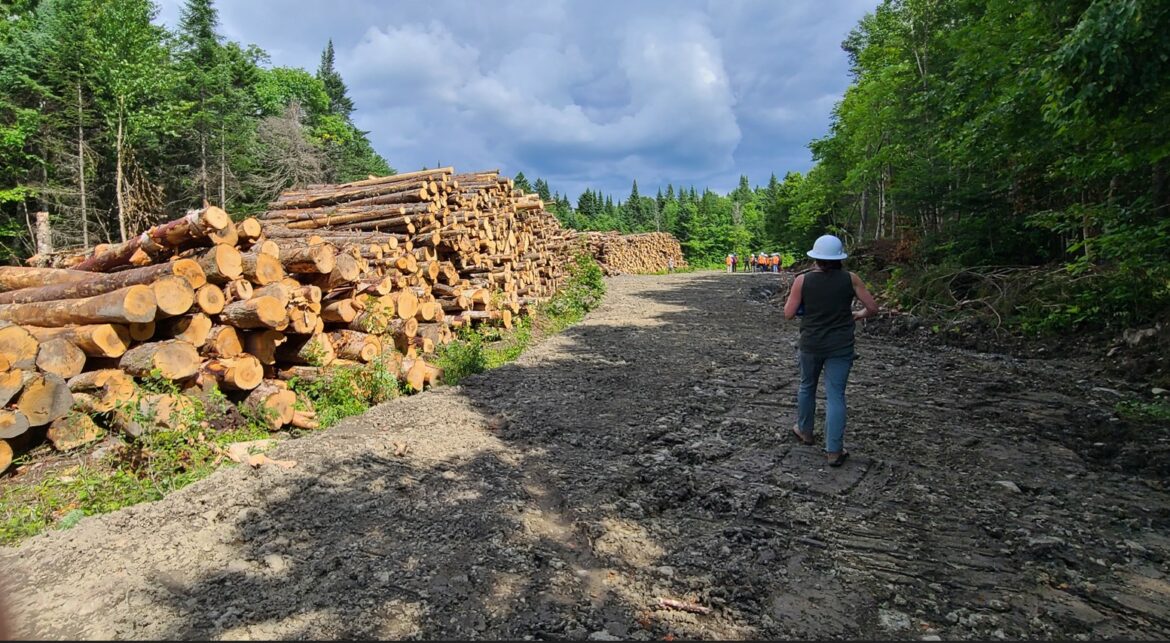By PAULA TRACY, InDepthNH.org
PITTSBURG – In October, the state expects to sit down with the new owners of the 146,500 Connecticut Lakes Headwaters Tract to hear what their future plans are as they relate to logging and carbon credits, the commissioner overseeing an easement said.
Sarah Stewart, commissioner of the Department of Natural & Cultural Resources said, “the gist is the company owes us an updated, revised annual operating plan, a forest management plan, and they expect to get that to us by October. And at that point, we can sit down and have a real conversation about what the impacts are.”
She said a joint letter was being drafted to the Connecticut Lakes Citizens Advisory Committee by her and Patrick D. Hackley, director of the Division of Forests & Lands.
Hackley said the state is urging Bluesource, the new land owner, to consider the importance of logging on the land as part of the easement they assumed when they took it over along with hundreds of thousands of other acres of industrial timberland across the country.
“We have urged them to keep in mind the purpose of the conservation easement is to maintain a ‘working forest’ that includes timber harvesting among other important values such as public access for recreation and wildlife habitat management,” the joint letter from Hackley and Stewart states.
From the town of Pittsburg potentially losing about 10 percent of its tax revenue from a lack of logging, to the mills, truckers and others who make their living in the woods here, this is a big issue which they heard about through rumors and little in the way of upfront discussions from Bluesoure now that a company – whose mission is not to log but to sell carbon credits – has taken over fee ownership in a merger last October with the Forestland Group.
Stewart said on Thursday in an email: “Just to clarify, the Department of Justice is still reviewing the situation and has not made any recommendations on how to proceed as they are still exploring all options.”
This parcel in New Hampshire – in Pittsburg, Stewartstown and Clarksville – represents 10 percent of the land…purchased.
“This story is going to be playing out all across the country as those lands all shift from working forests to climate credit farms,” said state Rep. Eamon Kelley, D-Berlin.
“Anew Climate of which Bluesource is a subsidiary had pledged $4 million to bring sustainability-focused jobs to affected communities, but that money would hardly be enough to counter the fallout in Coos County, let alone their other holdings nationally,” he said.
“They have been remarkably unresponsive to state and local officials to this point. I expect that there could be some there who have strong opinions on the situation.”
The land was owned by International Paper Company and heavily used to feed the mills of the region for years before it was offered for sale two decades ago, starting a scramble in state and federal circles to protect the land from development.
Charles Levesque told elected officials the new model to manage the largest block of land in the state is now controlled by a massive company that has a mission to not cut trees but instead to sell the credits to not cut. Apparently, corporations are paying more than the mills.
Not cutting the wood has massive impacts to the region’s forest products economy, the tax base for Pittsburg, Clarksville and Stewartstown, and natural habitat of the Great North Woods.
“Every one of us is panicking,” said Carie Pinheiro of Stewartstown “A lot of the older folks don’t understand it because it’s so new.”
Pittsburg Selectboard member Steve Ellis said the town received $175,000 in timber tax so far this year and that is almost 10 percent of the town’s $2 million budget.
Officials for both Milan Lumber, which mills softwood from the tract and Ethan Allen which takes hardwood, said they will be hard pressed to replace the product and will have to look much farther afield to keep their operations rolling, and officials for Milan Lumber said they had to have a summer furlough for most of their workers.
Margaret Machinist, who manages the forest easement for the state Division of Forests and Lands said she is working with other state officials on the contract and potential recourse and noted the governor’s office has also asked for a review of the situation.
Levesque urged those in attendance to press for more information from the new owners.
“Don’t stop. Keep the pressure on,” said Levesque. “Maybe they should realize that this land isn’t for them…and they weren’t here when all this happened and how important it is to the economy of this state,” said Levesque.





